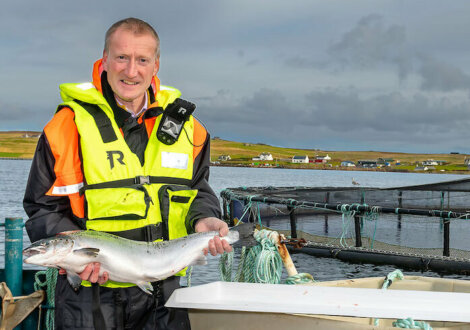Nature / Salmon industry keen to see licence fees used to tackle rural ‘housing crisis’
The idea has been welcomed by Shetland MSP Beatrice Wishart
SHETLAND’s MSP has welcomed an “innovative proposal” from the salmon industry to see licence fees and seabed rent reinvested in affordable housing in rural areas.
Beatrice Wishart said the proposal could help to address depopulation.
Industry body Salmon Scotland this week called for £10 million-a-year in farming licence fees, paid to Crown Estate Scotland, to be ringfenced for areas where farms operate.
It said that a particular focus should be given to housing, with a lack of affordable and available homes affecting communities in the Highlands and Islands.
Salmon Scotland said this is preventing key vacancies in the sector being filled.
Crown Estate Scotland manages the country’s seabed out to 12 nautical miles and coastline, and it receives lease and rent money as income.
At present, salmon farming contributes more than £5 million directly to Crown Estate Scotland or more than a fifth of the quango’s revenues, with this fee set to nearly double.
This money passed to the Scottish Government and is redistributed around the country.
Planned rent hikes mean that more than £20 million per year is soon expected to be paid by salmon farming companies to regulators and quangos.
However, due to the recent auction of offshore wind farm licences, overall income at Crown Estate Scotland is set to soar. For 2022/23 its gross revenue is set to increase by £70 million due to the ScotWind auction.
Salmon Scotland chief executive Tavish Scott said: “The farm-raised Scottish salmon sector creates jobs and wealth right across Scotland, but we believe our neighbours – the people who live closest to our salmon farms – should be the ones who benefit the most.
Become a supporter of Shetland News
“Rather than this money going into a central pot in Edinburgh, seabed rents paid to the Crown Estate should be returned to benefit our coastal communities.
“The most pressing crisis facing our Highland and Island communities is the complete lack of access to available, affordable housing.
“So we’re calling for the money raised through salmon farm rents to be re-invested in local communities to address the biggest issue affecting our coastal communities – access to affordable housing.
“Salmon farmers are embedded in their local communities and want the economic benefit generated by Scotland’s biggest food export to be shared in the local communities where they operate.”
Wishart praised the idea by the former MSP for Shetland, and said: “The lack of affordable housing restricts young people who want to live in rural areas near their place of work, with many working in the salmon industry and its supply chain.
“This proposal can help address depopulation and would benefit the economy and local businesses, making Shetland more attractive for external investment and infrastructure.
“Aquaculture in Shetland is reliant on internal ferries. Infrastructure investment for tunnels between isles could in turn benefit our salmon farming neighbours.”
A spokesperson for Crown Estate Scotland said the organisation’s net revenue already goes towards “investment in a range of public services including supporting vulnerable coastal communities”.
“From 2017 to 2020, more than £28m was passed by Scottish Government to coastal local authorities to support Covid-19 recovery projects, economic regeneration and job creation, flood protection, environmental projects, and more.”
Money specific to Shetland already comes to the isles after Crown Estate Scotland began distributing portions of its income to councils based on net revenues from marine assets out to 12 nautical miles.
In Shetland this income goes into the coastal communities fund, and local groups can bid for a slice of the money.
It is designed to support projects that “safeguard sustainable economic growth and jobs, promote inclusion and contribute towards poverty reduction”.
More than £2 million has been distributed in Shetland through the fund since its introduction in August 2020.
Become a supporter of Shetland News
Shetland News is asking its many readers to consider start paying for their dose of the latest local news delivered straight to their PC, tablet or mobile phone.
Journalism comes at a price and because that price is not being paid in today’s rapidly changing media world, most publishers - national and local - struggle financially despite very healthy audience figures.
Most online publishers have started charging for access to their websites, others have chosen a different route. Shetland News currently has over 600 supporters who are all making small voluntary financial contributions. All funds go towards covering our cost and improving the service further.
Your contribution will ensure Shetland News can: -
- Bring you the headlines as they happen;
- Stay editorially independent;
- Give a voice to the community;
- Grow site traffic further;
- Research and publish more in-depth news, including more Shetland Lives features.
If you appreciate what we do and feel strongly about impartial local journalism, then please become a supporter of Shetland News by either making a single payment or monthly subscription.
Support us from as little as £3 per month – it only takes a minute to sign up. Thank you.















